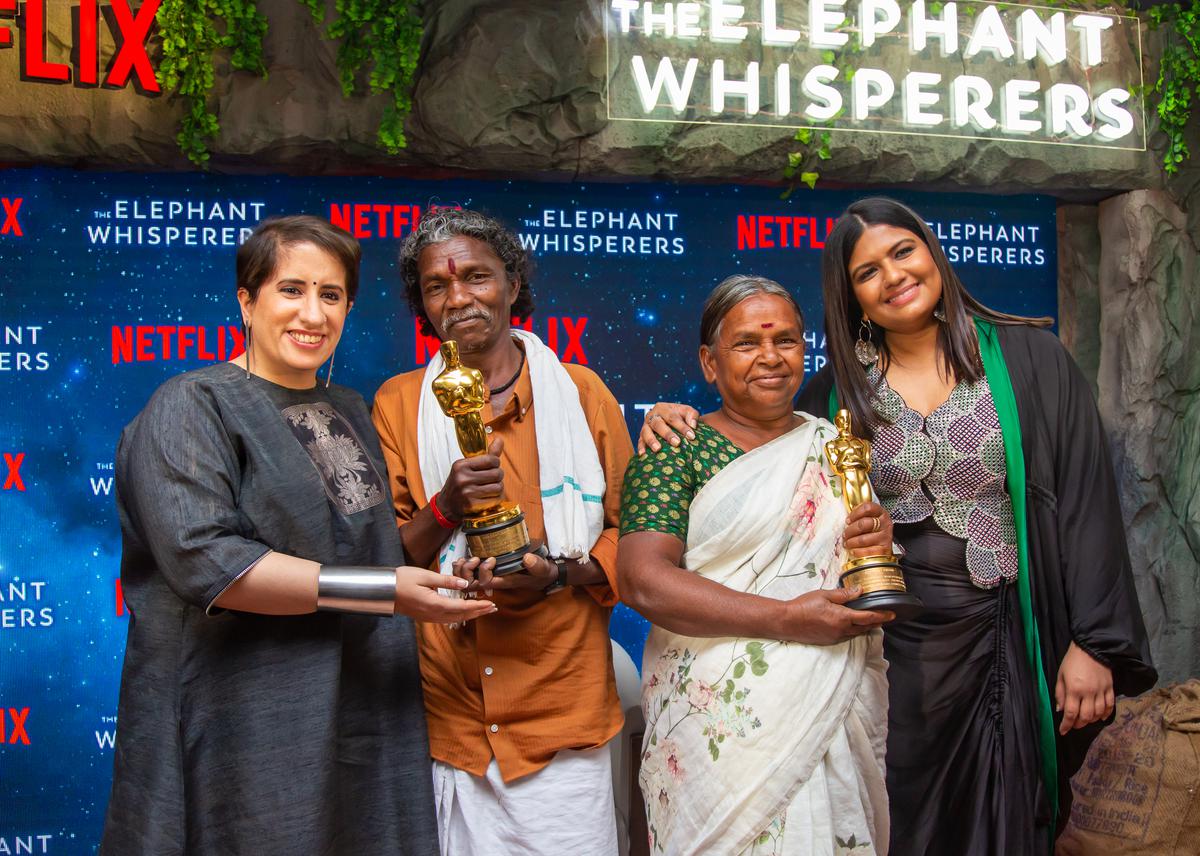[ad_1]
Kartiki Gonsalves and Guneet Monga at the Oscars
| Photo Credit: MIKE BLAKE
After she was unceremoniously played off at the 95th Academy Awards — where The Elephant Whisperers won Best Documentary Short Film — producer Guneet Monga turned back to the rostrum and yelled out, “This is India’s first film to win an Oscar!” It was a thrilling moment, for obvious reasons, yet entirely of a piece with Guneet, whose tenacity and ferociousness as a film champion are well known.
“We were always told we will only get 45 seconds,” Guneet says, looking back at the strange, bittersweet moment that marked her win. She was happy that Kartiki Gonsalves, the film’s director and co-winner of the award, got to read out her speech in full, shining a light on conservation, ecological co-existence and the rights of indigenous communities. But she would have still liked to say a few words herself.
“It came as a shock and a surprise. It’s a mixed feeling,” Guneet shares. When she shouted out her line, she could catch, from the corner of her eye, Riz Ahmed, Ava DuVernay and Malala Yousafzai cheering in the audience. “The win and the support definitely surpassed everything. Kartiki and I have won our Oscars in our thirties. I am sure there will be many more occasions and more speeches.”
The Elephant Whisperers is a warm, spirited, life-affirming documentary. Set in the Theppakadu Elephant Camp inside the Mudumalai Tiger Reserve in Tamil Nadu, it follows the lives of Bomman and Bellie, a tribal couple who nourish and care for two baby elephants, combing their hair, feeding them water and coconut mash, even gently admonishing them — as parents do — at signs of truancy.
The 41-minute film was one of two wins for India at the 2023 Oscars; ‘Naatu Naatu’ from SS Rajamouli’s RRR won Best Original Song. A second documentary, the feature-length All That Breathes, directed by Shaunak Sen and also pivoted on human-animal relationships, was nominated but did not win.
ALSO READ: Why It Matters | Oscar win for ‘The Elephant Whisperers’
Collectively, it was a major year for Indians and South Asians at the Oscars (the ‘Naatu ‘Naatu’ live rendition row notwithstanding). Kartiki was stationed in LA for four months; Guneet joined her a month before the ceremony. The campaigning process was long and unforgiving, but a sense of camaraderie with the other nominees and support from the community saw them through.
“Everyone from Kal Penn to Priyanka Chopra Jonas and Anjula Acharia opened up their phone books for us,” Guneet recalls. “Chef Vikas Khanna went out of his way to promote the film. From Deepak Chopra to Salman Rushdie, everyone was cheering us on.”
At the Oscars, Kartiki remembers Michelle Yeoh and Jamie Lee Curtis — who won Best Actress and Best Supporting Actress respectively for Everything Everywhere All At Once — running up to her; they had seen and loved The Elephant Whisperers, especially the bond that develops between Raghu and his human caregivers. She was equally thrilled to have global dreamboat and The Last of Us star Pedro Pascal announce their win. “I loved how he pronounced our names,” Kartiki says.

Bomman and Bellie with the Oscar trophies
| Photo Credit:
Special Arrangement
The day of this interview, Kartiki and Guneet honoured Bomman and Bellie at a press conference in Mumbai. Earlier, Tamil Nadu Chief Minister MK Stalin had felicitated them and issued cash rewards for the mahouts and caretakers in the State’s elephant camps. The film has had a positive impact on their lives, Kartiki says. “We have a lot of people visiting the Theppakadu camp and interviewing Bomman and Bellie. They are being seen as the rightful heroes of this story. The elephants too, in a way, have managed to connect with the larger mass through the film. I think this is where conservation really begins.”
She brushes aside the chatter that Bomman and Bellie had not seen the film, reiterating that they were the first ones to watch it. “I showed it to them even before I had submitted the final cut. They had never seen themselves on screen before and were in tears by the end of it.” Documenting their lives for six years, in an intimate yet unobtrusive way, Kartiki too became a kind of foster daughter to the couple. “Bomman and Bellie have told Kartiki they want to be at her wedding,” Guneet says.
Both Guneet and Kartiki hope the success of The Elephant Whisperers and All That Breathes ushers in a new era of non-fiction filmmaking in India. It is already underway, they are quick to add. Earlier, Period. End of Sentence (2018), a short documentary on which Guneet was executive producer, had won an Oscar. And before All That Breathes, Rintu Thomas and Sushmit Ghosh’s Writing with Fire was nominated for Best Documentary Feature – the first for India. Beyond the Academy Awards, Indian documentaries have been winning at Cannes, Sundance, Amsterdam, Busan, and Toronto.
“In the past, we had people coming from outside to tell Indian stories,” Kartiki says. “But now a tiny indigenous film from South India, in a language not even all Indians understand, has won an Oscar. So I am hoping this will open doors.”
The Elephant Whisperers is currently streaming on Netflix
[ad_2]
Source link


